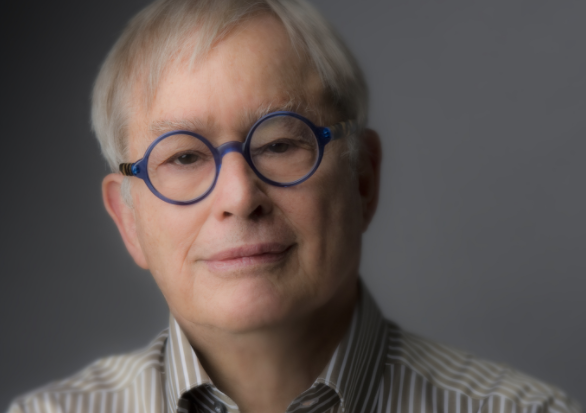ZGF Founding Design Partner, Robert Frasca, FAIA, passed away on January 3 in Portland, Ore., at the age of 84 from complications of CLL (chronic lymphocytic leukemia).
Frasca was a driving force in transforming the architectural firm from its early beginnings as a regional office into one of the nation’s largest practices, with 600 design professionals across six offices in the U.S. and Canada. Based on a portfolio of work under Frasca’s direction, ZGF was honored with the prestigious AIA Architecture Firm Award in 1991.
Encouraged by his mentor, Pietro Belluschi, Frasca arrived in Portland in 1959, equipped with a Master of City Planning from the Massachusetts Institute of Technology (1959), where Belluschi was Dean. He received his Bachelor of Architecture from the University of Michigan in 1957. He worked part time at the firm Wolff and Zimmer Architects and part time at the City Planning Commission. Several months later Frasca was awarded the George G. Booth Traveling Fellowship from the University of Michigan, given to an outstanding graduate, and traveled throughout Europe. On returning to Portland (Norm Zimmer sent him a one-way ticket), Frasca rejoined Zimmer and, along with Brooks Gunsul, formed the firm, Zimmer Gunsul Frasca (1966).
In an era when buildings were most often conceived as isolated monuments with little regard to the surrounding urban fabric, Frasca innately understood the importance of a strong and dynamic architecture to unite the entire community. He quickly became the consummate “Citizen Architect” creating notable work that ranged from civic and institutional master plans to individual buildings that elevated the quality of the built environment and the overall urban experience.
He played an important role in the evolution of Portland as a livable city and was instrumental in shaping its skyline and integrative spirit. He designed many of Portland’s most important civic projects, including Waterfront Park, Oregon Historical Society, Oregon Museum of Science and Industry, Justice Center, Oregon Convention Center, and Portland International Airport—the latter consistently ranked as one of the country’s most admired airports.
 Frasca designed many of Portland, Ore.’s most important civic projects, including the Portland International Airport. Photo courtesy ZGF
Frasca designed many of Portland, Ore.’s most important civic projects, including the Portland International Airport. Photo courtesy ZGF
He executed the master plan and designed many buildings for Reed College and for Oregon Health & Science University (OHSU), as well as the Multnomah Athletic Club, KOIN Tower, and Portland General Electric’s headquarters (now the World Trade Center).
Expanding on his integrative design approach, Frasca pioneered a holistic and humane architectural understanding of research facilities and pediatric hospitals—one that focused on occupant wellness and intellectual collaborations in the service of scientific discoveries and positive patient outcomes for the world’s most pressing diseases. He integrated nature, healing gardens, and art into his buildings long before research proved their importance. The first buildings of this type that he designed were the Vollum Institute and Doernbecher Children’s Hospital at OHSU. These buildings put ZGF on the map, and shortly other institutions were seeking their expertise. These included Children’s Hospital of Los Angeles, Children’s Hospital Colorado in Denver, Fred Hutchinson Cancer Research Center in Seattle, the National Institutes of Health in Bethesda, the Mortimer B. Zuckerman Research Center at Memorial Sloan-Kettering Cancer Center in New York City, the Dana-Farber Yawkey Cancer Institute, Center for Cancer Care in Boston, The Max Planck Institute for Neuroscience in Florida, and the Carnegie Institute for Science in Baltimore.
As his reputation grew, Frasca designed science and engineering buildings, medical school buildings, and research facilities for premier universities across the country, including the University of California-Berkeley, Cornell University, Duke University, Stanford University, Williams College, Emory University, and Johns Hopkins University. The Robert Mondavi Wine and Food Institute at the University of California Davis combined his love of wine, food, and science. These facilities always focused on the student and faculty experience using great landscape, natural light, atrium spaces, informal study and lounge areas, and places to meet serendipitously.
Working with the State Department in their Design Excellence program, Frasca designed U.S. embassies and consulates in Istanbul, Sofia, and Cape Town, South Africa. A unique project was the LDS Conference Center in Salt Lake City across Temple Square from the Mormon Tabernacle, with seating for 21,000 and a four-acre green roof garden designed with landscape architect Laurie Olin, a frequent collaborator.
He was committed to designing work that enhanced collaboration, and the team-based approach he nurtured at ZGF allowed countless young designers to grow and thrive at the firm. In addition to his practice at ZGF, Frasca shared his expertise with students and the broader profession including chairing the AIA National Honor Awards program, the AIA Committee on Design, and the AIA Topaz Awards program. He served on multiple jury selection committees, and performed peer reviews for numerous projects. He also spent 27 years on the University of Washington Architecture Commission, shaping that campus by championing other talented designers.
Frasca was born in Niagara Falls, N.Y., to parents who immigrated from Italy. He is survived by his wife, Jeanne Giordano, his children Andrea and Jason by his first marriage to Marilyn Buys (deceased in 2000), his grandson Nicolas, his sister Joyce Broderson, his nephew, David, and sister-in-law, Lorraine Giordano.
Donations in memory of Bob Frasca can be made to:
The Trustees of Columbia University
Notation: Dr. Nicole Lamanna CLL Research Gift Fund/memory of Bob Frasca
Marilyn Mullins
Senior Director of Development
Columbia University Medical Center
100 Haven Avenue, Suite 29D
New York, NY 10032
Related Stories
Adaptive Reuse | Sep 12, 2024
White paper on office-to-residential conversions released by IAPMO
IAPMO has published a new white paper titled “Adaptive Reuse: Converting Offices to Multi-Residential Family,” a comprehensive analysis of addressing housing shortages through the conversion of office spaces into residential units.
Mixed-Use | Sep 10, 2024
Centennial Yards, a $5 billion mixed-use development in downtown Atlanta, tops out its first residential tower
Centennial Yards Company has topped out The Mitchell, the first residential tower of Centennial Yards, a $5 billion mixed-use development in downtown Atlanta. Construction of the apartment building is expected to be complete by the middle of next year, with first move-ins slated for summer 2025.
Healthcare Facilities | Sep 9, 2024
Exploring the cutting edge of neuroscience facility design
BWBR Communications Specialist Amanda Fisher shares the unique considerations and challenges of designing neuroscience facilities.
Office Buildings | Sep 6, 2024
Fact sheet outlines benefits, challenges of thermal energy storage for commercial buildings
A U.S. Dept. of Energy document discusses the benefits and challenges of thermal energy storage for commercial buildings. The document explains how the various types of thermal energy storage technologies work, where their installation is most beneficial, and some practical considerations around installations.
Office Buildings | Sep 5, 2024
Office space downsizing trend appears to be past peak
The office downsizing trend may be past its peak, according to a CBRE survey of 225 companies with offices in the U.S., Canada, and Latin America. Just 37% of companies plan to shrink their office space this year compared to 57% last year, the survey found.
University Buildings | Sep 4, 2024
UC San Diego’s new Multidisciplinary Life Sciences Building will support research and teaching in both health and biological sciences
The University of California San Diego has approved plans for a new Multidisciplinary Life Sciences Building, with construction starting this fall. The 200,000-sf, six-level facility will be the first building on the UC San Diego campus to bridge health science research with biological science research and teaching.
Codes and Standards | Sep 3, 2024
Atlanta aims to crack down on blighted properties with new tax
A new Atlanta law is intended to crack down on absentee landlords including commercial property owners and clean up neglected properties. The “Blight Tax” allows city officials to put levies on blighted property owners up to 25 times higher than current millage rates.
Resiliency | Sep 3, 2024
Phius introduces retrofit standard for more resilient buildings
Phius recently released, REVIVE 2024, a retrofit standard for more resilient buildings. The standard focuses on resilience against grid outages by ensuring structures remain habitable for at least a week during extreme weather events.
Construction Costs | Sep 2, 2024
Construction material decreases level out, but some increases are expected to continue for the balance Q3 2024
The Q3 2024 Quarterly Construction Insights Report from Gordian examines the numerous variables that influence material pricing, including geography, global events and commodity volatility. Gordian and subject matter experts examine fluctuations in costs, their likely causes, and offer predictions about where pricing is likely to go from here. Here is a sampling of the report’s contents.
Adaptive Reuse | Aug 29, 2024
More than 1.2 billion sf of office space have strong potential for residential conversion
More than 1.2 billion sf of U.S. office space—14.8% of the nation’s total—have strong potential for conversion to residential use, according to real estate software and services firm Yardi. Yardi’s new Conversion Feasibility Index scores office buildings on their suitability for multifamily conversion.

















